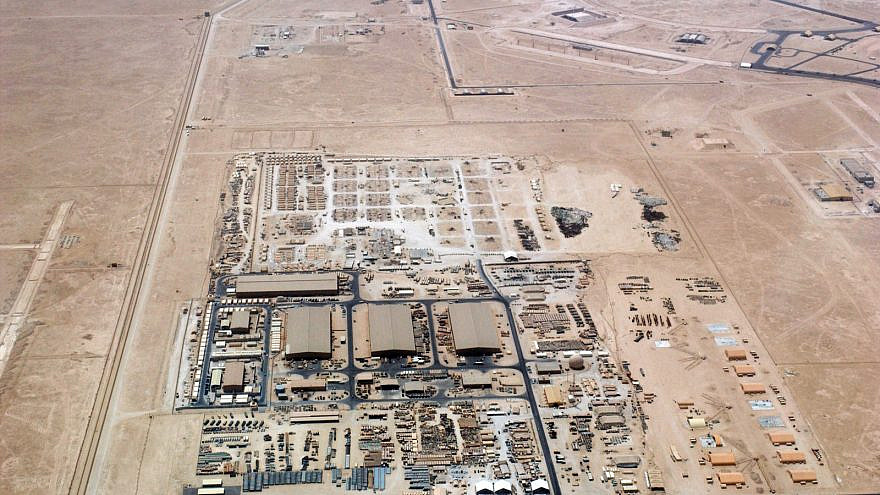‘Next big step’: Experts advocate relocating Israel to US military’s Central Command
By YAAKOV LAPPIN
As the Middle East remains on edge due to sky-high tensions between the United States and Iran, and with the U.S. Air Force holding a joint drill with Saudi Arabia’s Royal Air Force, the Pentagon and the Israeli defense establishment remain in close touch as they monitor developments.
Yet a report released by the Jewish Institute for National Security of America—a pro-Israel think tank based in Washington D.C., that includes senior former American military commanders—has called for that cooperation to be tightened further by relocating Israel away from the area of responsibility of the U.S. Military’s European Command (EUCOM) and to that of the Central Command (CENTCOM), also known as America’s Middle East Command.
The report said that while Israel’s inclusion in EUCOM has yielded clear mutual benefits over the years, CENTCOM’s priority is “countering Iran and other forces for extremism in the Middle East, and all our partners in the region—Israel included—are coalescing around a common view of that threat and taking bold steps like the Abraham Accords to counter it cooperatively.”
While America’s core interest in Middle East stability remains unchanged even as it pivots away from the region, the report said that “Israel’s future role will include defending U.S. interests by rolling back Iran’s footprint in CENTCOM’s area of responsibility.”
Meanwhile, EUCOM is reverting back to its traditional focus—strengthening NATO to counter Russia, according to the report.
‘Increasingly shared threats from Iran and its proxies’
Jonathan Ruhe, director of foreign policy at JINSA, told JNS that institutional tradition has largely kept Israel under EUCOM’s jurisdiction, a set-up that has endured since EUCOM’s creation in 1952.
“More recently, there have been real mutual benefits, especially after 9/11, [that] keeping Israel in EUCOM was a clear asset for the United States and other NATO members that suddenly needed a partner with hard-won counterterrorism expertise. And EUCOM and Israel have developed robust missile-defense cooperation that clearly benefits both sides,” he explained.
The IDF and EUCOM hold a biannual joint missile-defense exercise, called “Juniper Cobra,” which sees the United States practice the rapid deployment of missile-defense systems and personnel from Europe to Israel to assist in air-defense missions.
But a relocation to CENTOM would enable “much stronger, regularized cooperation between Israel and U.S. forces in the Middle East,” argued Ruhe, “which together confront increasingly shared threats from Iran and its proxies.”
“Moving Israel to CENTCOM could facilitate something approaching a truly regionwide missile-defense network, which could bolster shared early warning,” he said while making efforts to counter Iran’s proliferation of missiles and drones more effective.
Such a move could also encourage the United States to position weapons on Israeli soil, he said, “especially precision munitions that both Israel and CENTCOM would need in abundance in a major conflict with Iran and/or its proxies; currently, EUCOM has little or no reason to replenish these stockpiles since it wants those munitions in Europe for a possible conflict with Russia.”
One caveat for the relocation would have to be that CENTOM continues strong, mutually beneficial missile-defense cooperation with Israel, he stressed, adding that “it helps that CENTCOM forces have participated in Juniper Cobra in the past, and that CENTCOM and its Arab partners certainly would benefit from stronger ties to Israel’s world-class missile-defense architecture.”
Under the present tensions, reassigning Israel to America’s Middle East Command would reinforce military deterrence and send out the message of regional unity against Iran that’s been so clearly communicated by the Abraham Accords, stated Ruhe.
“More concretely, it would enable Israel, the United States and Arab partners to conduct joint exercises and contingency planning for Iran-specific threats. This would boost readiness and interoperability, including by enabling U.S. and Arab forces in the Middle East to learn invaluable lessons from Israel’s ‘campaign between the wars’ against Iran,” he said, referring to Israel’s campaign of strikes to prevent the Islamic Republic from building attack bases in Syria.
Asked how the defense establishments of both countries have responded to the idea, Ruhe said that when JINSA first proposed it three years ago, reactions from both were mixed, though more recently, he had been pleasantly surprised at the increasingly positive feedback from both countries.
“I think it reflects the fundamental convergence of Israel’s threat landscape with that of key Arab neighbors and U.S. forces in the Middle East, especially as EUCOM understandably returns to its traditional European focus on great-power competition with a revanchist Russia,” he stated.
Ultimately, since any conflict with Iran—whether Israeli, American or both—will occur mainly in CENTCOM’s area of responsibility, “it would be much easier for Washington and Jerusalem to coordinate or at the very least deconflict their forces if Israel were in CENTCOM; by the same token, this would also bolster deterrence against Iran.”
The report stated that the recent Abraham Accords between Israel, and the United Arab Emirates and Bahrain, reflect a growing strategic alignment between Israel and key American partners in the Middle East, driven primarily by rising Iranian nuclear and regional threats.
“American diplomacy played a central role in realizing the accords, underscoring the enduring importance of Middle East stability to our national security. The next big step, the report said, is to move Israel into CENTOM, which will enable improved strategic and operational coordination among the United States, Israel and our Arab partners throughout the region against Iran and other serious shared threats.”
The U.S. military divides its global presence into seven geographic combatant commands, each of which implements U.S. defense policy and exercises unified command over all American forces in its AOR.
In these capacities, they also work with and coordinate among partner militaries, effectively making each COCOM a primary mechanism for U.S-led regional cooperation on strategic planning, training, doctrine, logistics, intelligence, technology, procurement, operations and other critical military activities.
Originally published in JNS

